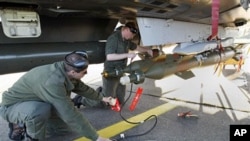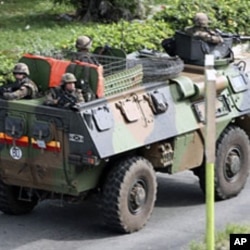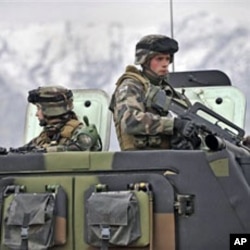The three French military operations - in Afghanistan, Libya and Ivory Coast - are very different. France's involvement in Afghanistan is a holdover of the previous conservative government and within the framework of NATO. But only recently has France taken a prominent role in helping quell the unrest in Libya and Ivory Coast - displaying a new openness toward using force on the part of President Nicolas Sarkozy.
In a spate of interviews this week - including this one on France 2 television - Foreign Minister Alain Juppe argued there was no change in French policy.
Mr. Juppe said that in both Libya and Ivory Coast, France was working within the framework of international law - notably UN mandates to protect civilians. He said France had no intention of deploying a more offensive foreign policy.
But analysts see other motives behind French action. In Libya, Paris not only launched the first airstrike against forces loyal to Libyan leader Moammar Gadhafi, but also became the first country to diplomatically recognize the rebel National Libyan Council in Benghazi. In Ivory Coast, France's Licorne force and UN troops have attacked President Laurent Gbagbo's forces.
Clara O'Donnell, a research fellow at the London-based Center for European Reform, said France's forceful role in Libya came as a surprise.
"Simply because of the nearly 180 degree turn in which France - and particularly President Sarkozy - underwent in the run-up to this intervention. France had had very close ties with Libya in recent years, and we go from one extreme to the other," said O'Donnell.
French intellectual Bernard Henry Levy, who has close ties with Benghazi's opposition council, says Mr. Sarkozy was swayed into action after meeting with its top members - at Levy's request.
"I was proud and I'm very proud of my country to have taken the good move. And to have had, maybe, an influence on others," Levy said.
When it comes to Ivory Coast, prominent Ivorian journalist Venance Konan says Mr. Sarkozy was also right to intervene - to prevent further civilian bloodshed. He says while some Ivorians might accuse former colonial power France of meddling, most will not.
"Don't forget that the majority in Cote d'Ivorie voted for [internationally recognized President Alassane] Ouattara. and this majority will support Mr. Sarkozy for helping them install democracy," said Konan.
What is driving Mr. Sarkozy? When it comes to Libya, analyst Philippe Moreau Defarge of the French Institute of International Relations says the president is partly making amends for France's initial support of the former regime in neighboring Tunisia during that country's January revolt.
"France has the same dilemma as the United States - on the one side, when you are a great power, very present in the region, what you want is to preserve stability - your priority is stability," said Dfearge.
But at the end, Defarges says, France and the United States ultimately will support democracy. He also believes there's another reason for Mr. Sarkozy's more muscular policy.
"France would like to keep a great power status and to preserve a specific national foreign policy," Defarge added. "And to a certain extent, maybe they're [French diplomats] happy to have such a passive European Union showing that Europe needs to keep great powers like France."
Center for European Reform's O'Donnell agrees French force contrasts starkly with the low-key reaction to Libya by the European Union as a whole. She draws parallels with the Balkan conflict - a decade ago.
"What's very striking is that we're over a decade down the line and the same problems are there," O'Donnell said. "We still have very strong disagreements about the extent to which Libya should be perceived as a strategic threat, very strong disagreements about if force is the best way to deal with that threat - and again, military capability in most countries is completely inadequate. And I think this is a sad indictment of the limited progress the Europeans have made in trying to pursue any kind of common defense policy."
The fallout, O'Donnell says: Increasingly France - as well as Britain - is becoming disillusioned with a common European defense policy. Increasingly, she believes, the two countries will be forging ahead militarily - in some cases, alone.












